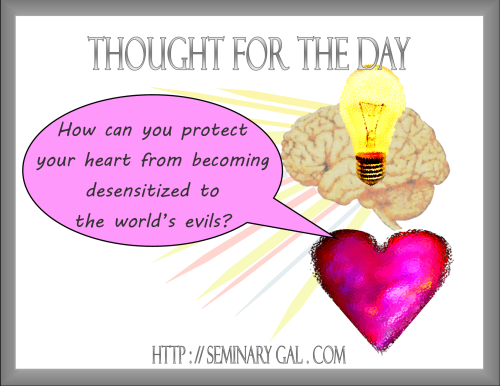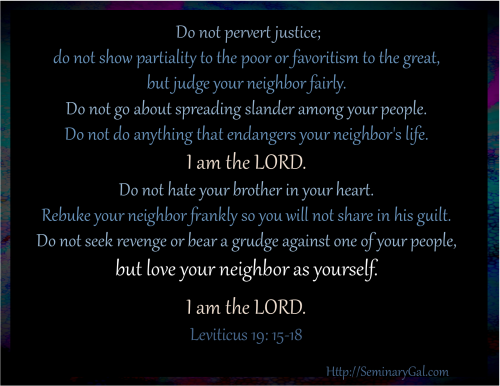Rekindle My Outrage (Lent 12, 2016)
Uh-oh, you may be thinking. Outrage. There she goes again. But love and understanding are only one part of the equation.
When love and understanding meet injustice and sin, it’s only natural to experience what God does: outrage.
Wrath—the biblical word for outrage—speaks of God’s righteous anger at what harms those He both loves and created. It’s not an uncontrolled anger like rage. It’s not a generalized concept like peeved. It’s not undirected or uninformed like just plain mad. It’s not all heat of action and no light of knowledge like fury.
Wrath is one of those things we know exists (if we’re honest) but no one likes to talk about. Wrath arises out of love and understanding but also the moral consequences of ungodly actions which God sees solely through His moral framework.
Outrage is a moral quality of which we could all use some rekindling in that important moral context.
 We’ve become desensitized.
We’ve become desensitized.
Murder? Whatever. It’s every day on the news. With dash-cams, we can even watch it happening as if it’s not really real or that the person killed was not actually a fellow human being. The video can go viral and people will watch it over and over again in gruesome prurience. Assault? Smash and grab? Knockout–just a game? Date rape? We’ve lost our sense of outrage because we have stopped caring about the moral consequences of sin.
Remember back to Leviticus 19? There are moral consequences to our fellow man and God is outraged by sin. God desires us to care deeply about each other, not just the lower standard of not sinning against them. Leviticus 19: 9 “‘When you reap the harvest of your land, do not reap to the very edges of your field or gather the gleanings of your harvest. 10 Do not go over your vineyard a second time or pick up the grapes that have fallen. Leave them for the poor and the alien. I am the LORD your God. 11 “‘Do not steal. “‘Do not lie. “‘Do not deceive one another. 12 “‘Do not swear falsely by my name and so profane the name of your God. I am the LORD. 13 “‘Do not defraud your neighbor or rob him. “‘Do not hold back the wages of a hired man overnight. 14 “‘Do not curse the deaf or put a stumbling block in front of the blind, but fear your God. I am the LORD. 15 “‘Do not pervert justice; do not show partiality to the poor or favoritism to the great, but judge your neighbor fairly. 16 “‘Do not go about spreading slander among your people. “‘Do not do anything that endangers your neighbor’s life. I am the LORD. 17 “‘Do not hate your brother in your heart. Rebuke your neighbor frankly so you will not share in his guilt. 18 “‘Do not seek revenge or bear a grudge against one of your people, but love your neighbor as yourself. I am the LORD.”
So we rekindle our sense of outrage at what God hates and develop an outrageous grace toward other people. It’s hard to confront sin with a sense of godly outrage and genuine grace but we’re commanded to do it. Ephesians 5:11 Have nothing to do with the fruitless deeds of darkness, but rather expose them. 12 For it is shameful even to mention what the disobedient do in secret.
More than anything for today, take time to pray and ask God to reveal ways in which you’ve become timid and desensitized. Ways in which you’ve developed an unhealthy interest in the gruesome instead of an outrage against it. Ways in which you’ve stopped caring about your neighbors or being concerned for their very real humanity. Taking that to my heart personally, that’s what I’m praying today.
Give it up for Lent: a desensitized complacency
Questions for Leviticus 19:9-18 and Ephesians 5:11-12
- When we harm our brothers, why does God turn the insult heavenward and point out that He is the Lord? (Lev 19:10, 14, 18)
- In Lev 19:17, it speaks of our not hating our brothers, but rebuking our neighbors frankly. What is the distinction between the two? And what is Scripture’s reason for that admonishment?
- Likewise in Eph 5:11, what are we supposed to do with the fruitless deeds of darkness? What constitutes a fruitless deed of darkness? How do we know?
- Why do the disobedient do their fruitless deeds in secret?
- In American culture, how good have we been at exposing fruitless deeds of darkness and rebuking our neighbor frankly? Why do you think that is? What are we losing in confidence and in our culture by no longer seeing sin as sin?
 ReKindle is the 2016 Lenten devotional series from Seminary Gal.
ReKindle is the 2016 Lenten devotional series from Seminary Gal.
To receive these devotionals to your email inbox throughout Lent, please fill in your email address in the space provided on my Home Page in the sidebar (right) and respond to the verification email. If you already receive devotionals and articles, no need to do anything else. You’ll get them automatically. Thank you! Or log onto the SeminaryGal Facebook page and see them reprinted there.
Acknowledging that former years’ devotional series remain popular, Be Still and Know that I AM God can be obtained through the archives beginning in March 2014 and With Christ in the Upper Room is archived beginning February 18, 2015.


Leave a Reply